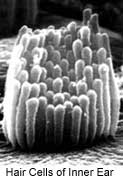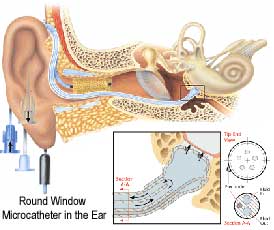By Barry Keate
Barry Keate, has lived with tinnitus over 40 years and has published 150+ research articles on numerous aspects of tinnitus. He is an expert on the condition and a well-known advocate for those with tinnitus.
Medical researchers searching for new medications for tinnitus often look to the connection between the nerve cells in the brain and the various agents that act as neurotransmitters, such a glutamate. Tinnitus can be caused when damaged hair cells emit an excess of glutamate. Many treatments including Arches Tinnitus Formula™ use ingredients that work as glutamate antagonists, or inhibitors. In this article, we will look at the important brain-tinnitus connection and discuss new medications for its treatment.
Communication between nerve cells in the brain is accomplished through the use of neurotransmitters. There are many compounds that act as neurotransmitters including acetylcholine, serotonin, GABA, glutamate, aspartate, epinephrine, norpinephrine and dopamine. These chemicals attach to nerve cells at specific receptors that allow for only one type of neurotransmitter to attach.
Some of the neurotransmitters are excitatory; leading to increased electrical transmission between nerve cells. Others are inhibitory and reduce electrical activity. The most common excitatory neurotransmitters are glutamate and aspartate while the primary inhibitory neurotransmitter is GABA. It is necessary for excitatory and inhibitory neurotransmitters to be in balance for proper brain function to occur.
 Communication over synapses between the inner hair cells of the cochlea and the auditory nerve is controlled by glutamate. When hair cells are damaged by exposure to loud noise or ototoxic medications, excessive glutamate is released. Glutamate is well known to have neurotoxic properties when excessively released or incompletely recycled. This is known as excitotoxicity and leads to neuronal death of the auditory nerve.
Communication over synapses between the inner hair cells of the cochlea and the auditory nerve is controlled by glutamate. When hair cells are damaged by exposure to loud noise or ototoxic medications, excessive glutamate is released. Glutamate is well known to have neurotoxic properties when excessively released or incompletely recycled. This is known as excitotoxicity and leads to neuronal death of the auditory nerve.
Excess glutamate opens the sodium channel in the neuron and causes it to fire. Sodium continues to flow into the neuron causing it to continue firing. This continuous firing of the neuron results in a rapid buildup of free radicals and inflammatory compounds. These compounds attack the mitochondria, the energy producing elements in the core of the neuron cell. The mitochondria become depleted and the neuron withers and dies.1
Excitotoxicity has been involved in a number of acute and/or degenerative forms of neuropathology such as epilepsy, Alzheimer’s, Parkinson’s, stroke, hearing loss and tinnitus.2 Excessive glutamate is the primary villain in cochlear-synaptic tinnitus.
There are two basic ways to correct this imbalance. The first is to activate GABA receptors that will inhibit the continuous firing caused by glutamate. Some anti-seizure medications, such a Neurontin, have been used for this with some success. 3 An article on the use of Neurontin can be seen in our Tinnitus Information Center.
Benzodiazepine anti-anxiety medications such as Xanax, Valium and Klonopin, also activate GABA receptors. Many physicians prescribe one of these for their tinnitus patients. They may also be used in conjunction with anti-seizure medications. These drugs are helpful in reducing anxiety and sound levels but cause drowsiness and can lead to dependence.
The second way to correct the imbalance is to treat with medications that are antagonistic to glutamate and its receptor N-methyl-d-aspartate (NMDA). These are termed glutamate or NMDA antagonists. By binding with these receptors, the antagonist medication reduces glutamate-induced continuous firing of the neuron.
While NMDA antagonists provide protection against brain damage in neurological disorders, they also have been shown to exhibit hallucinogenic properties in humans and damage neurons in the cerebral cortex of rats. Some researchers have combined these antagonists with GABA activating medications, such as diazepam and certain barbiturates, and have found they can reduce neurological damage caused by NMDA antagonists. 4
Medications for Tinnitus
Some medications that are currently on the market have been shown to be helpful as glutamate antagonists.
Memantine is an oral medication currently used to treat Alzheimer’s disease. Memantine blocks the NMDA receptor used by glutamate and reduces its effect. A study on Memantine for tinnitus showed a strong suppressive effect on glutamate activity when the medication was applied by transtympanic perfusion. 5
 Due to the manner in which the inner ear is sealed off from the rest of the body, most researchers believe that transtympanic perfusion is the preferred method of drug delivery. In this therapy, a micro catheter is inserted through the ear drum and attached to the round window. The medication is pumped into the catheter and allowed to sit against the round window where it gradually perfuses through it. This method has the advantage of delivering medication directly to the cochlea and avoiding systemic side-effects. An article by Michael Seidman, MD, discusses this method of drug delivery and medications.
Due to the manner in which the inner ear is sealed off from the rest of the body, most researchers believe that transtympanic perfusion is the preferred method of drug delivery. In this therapy, a micro catheter is inserted through the ear drum and attached to the round window. The medication is pumped into the catheter and allowed to sit against the round window where it gradually perfuses through it. This method has the advantage of delivering medication directly to the cochlea and avoiding systemic side-effects. An article by Michael Seidman, MD, discusses this method of drug delivery and medications.
Caroverine is another medication that acts as a glutamate antagonist. It is not available in the US but has been used in Austria for several years. Professor Klaus Ehrenberger at the University of Vienna, Otolaryngology Clinic, has been investigating the effects of Caroverine on tinnitus patients for several years. He initially began using an IV infusion on patients and had success in 63% of participants A related article about Caroverine can be seen in our Tinnitus Information Center.
AM-101 is an experimental medication being investigated by Auris Medical. No details are available while it is being tested but the company states it is an NMDA antagonist that suppresses tinnitus activity in animal models without affecting the regular activity of the auditory nerve. The compound is currently undergoing final pre-clinical testing and is expected to be tested in humans shortly.
The company states in a press release they have received numerous requests for inclusion in the clinical trial. They say the process is quite long and AM-101 will not be available anytime soon. They also say patients will be included according to well-defined criteria and they cannot offer participation to anyone who contacts them.
Campral (acamprosate calcium) has been in the news recently and is the subject of much speculation. It is a medication that has recently been approved by the FDA to treat alcohol dependence. Researchers hypothesize that Campral’s success is due to its effect as a glutamate antagonist. A small clinical trial of Campral conducted on 25 tinnitus patients in Brazil showed that 87% had some degree of relief and nearly 48% had a reduction of more than 50%. 6
In addition to the very small number of participants the study had other shortcomings. Researchers believe those on the active medication were aware of it because Campral causes drowsiness. They also say the drowsiness itself may have contributed to improvement as many tinnitus patients have trouble sleeping.
The study was also very short in duration (90 days) which may not have allowed for long-term side-effects to be exhibited. The Physician’s Desk Reference lists depression and events of a suicidal nature as being infrequent but more common than among those who took placebo. Other side-effects included diarrhea, 16%; anxiety, 6%; depression, 5%. There is a long list of other side-effects, occurring at a lower frequency.
The trial results and the theory behind them were viewed with caution by Robert Folmer, Chief of Clinical Services at the Tinnitus Clinic at the Oregon Health Sciences University. “Over the years, many different drug treatments have been tried for tinnitus,” Folmer said. “The first reports are almost universally positive, but as time goes on you often don’t hear about the drug being used again. I’m a bit skeptical about these early reports. Other drugs that are antagonists to glutamate haven’t worked out well.” 7
Ginkgo Biloba Extract, found in Arches Tinnitus Formula™, is a powerful glutamate antagonist. 8,9 Chelated zinc, also found in Arches TF, acts as a strong anti-oxidant within the cochlea, helping to minimize damage caused by free radical build-up. 10,11 Together they are the most effective non-prescription products for neuroprotection, free radical protection and the reduction of tinnitus and other neurodegenerative conditions.
Footnotes
1 – Santa Fe, NM, Health Press (1994), Excitotoxins: The Taste that Kills, Russell L. Blaylock, MD.
2 –Annals of the New York Academy of Sciences 884:249-254(1999), Excitotoxicity, Synaptic Repair and Functional Recovery in the Mammalian Cochlea: A Review of Recent Findings, Remy Pujol and Jean-Luc Puel.
3 – International Tinnitus Journal, Vol. 8, No 1 (2002); GABA-Benzodiazepine-Chloride Receptor-Targeted Therapy for Tinnitus Control, Shulman, A.; Strashun, A; Goldstein, B.
4 – Science, 1991 Dec 6; 254(5037):1515-8; NMDA Antagonist Neurotoxicity: Mechanism and Prevention. Olney, JW, et al.
5 – ORL J Otorhinolaryngol Telat Spec. 1998 Jan-Feb; 60(1):18-21. Memantine suppresses the glutamatergic neurotransmission of mammalian inner hair cells. Oestreicher E, Arnold W, Ehrenberger K, Felix D.
6 – Rev Bras Otorrinolaringol (Engl Ed). 2005 Sep-Oct; 71(5):618-23. Epub 2006 Mar 31. Tinnitus treatment with acamprosate: double-blind study. Azevedo AA, Figueiredo RR.
7 – Health, September 22, 2005; Ringing in the Ear May Respond to Alcoholism Drug, Ed Edelsen
8 – Journal of Ethnopharmacology (1996)Mar;50(3):131-139; The neuroprotective properties of the Ginkgo biloba leaf: a review of the possible relationship to platelet-activating factor (PAF). Paul F. Smith, Karyn Maclellan, Cynthia Darlington.
9 – Brain Research, Vol. 922, Issue 2, 20 December 2001, 282-292; Neuroprotective effects of bilobalide, a component of the Ginkgo biloba extract EGb761), in gerbil global brain ischemia; Krish Chandrasekaran, Zara Mehrabian, Brigitte Spinnewyn, Katy Drieu and Gary Fiskum.
10 – Otol Neurotol 2003 Jan;24(1):86-89; The Role of Zinc in the Treatment of Tinnitus. H. Nedim Arda, Umit Tuncel, Ozgur Akdogin and Levant Ozluoglu.
11 – Biol Trace Elem Res 2000;76:13-7; Antioxidant enzyme activities and trace element concentration is ischemia-reperfusion; Akeil E, Tug T, Doseyan Z.
